
“Little rice.” That’s the literal translation for Chinese electronics company Xiaomi, but its humble name hasn’t stopped it from conquering the Chinese smartphone market. And now it’s looking abroad, too.
Analysts say it’s precisely Xiaomi’s modesty that’s allowed it to dethrone Samsung and log the highest smartphone sales volume in the world’s biggest market this past quarter. A three-year-old firm known for its affordable prices and affable branding, Xiaomi shipped about 15 million units compared to Samsung’s 13.2 million in the second quarter this year, according to a report by Canalys.
“Samsung had been the leading vendor in China for the last two-and-a-half years, but [Xiaomi’s strong performance] comes in the context that Samsung has had an uncharacteristically weak performance,” Tom Shepherd, senior analyst at Canalys, told TIME, noting that the firm plans to adjust inventory after its 3G products had underwhelming sales. “We expect a sort of rally in terms of [Samsung’s third quarter] performance, but will that performance be sufficient to reestablish a leadership position over Xiaomi?”
But analysts are skeptical that Xiaomi will loosen its newfound grip on China’s smartphone market. Its sales overshadowed Apple’s a year ago, and the homegrown firm is on track for 60 million shipments in global smartphone sales this year, more than three times last year’s figure of 18.7 million, according to Linda Sui, senior analyst at Strategy Analytics. Estimates of the two manufacturers’ shipments in China suggest that “little rice” is reaping the harvest of its land:

“The two vendors are neck to neck,” Sui told TIME. “I think Samsung now feels much pain in low-tier and mid-tier markets in China. For low-tier and mid-tier markets, pricing is still the key factor in determining people’s purchasing behavior in China.”
Affordability has indeed been Xiaomi’s allure—Xiaomi’s most popular smartphones retail at half the price of most iPhones in China—but analysts believe the real cause of Xiaomi’s explosive growth is its localized and personalized features, the opposite of what’s made global brands like Samsung so successful. Unlike Samsung, Xiaomi has strategically sold 4G products while China Mobile pushes its 4G services; it has its own pre-installed Chinese app store, since Google Play is heavily censored; it boasts its user interface customization software unavailable on Samsung’s phones; and all phones arrive with pre-installed local business directories. With Xiaomi, “made in China” might not be so bad.
“We see that phrase evolving within China to the phrase ‘made for China,'” Jeff Orr, Senior Practice Director for Mobile Devices at ABI Research, told TIME. “‘Made in China’ is going to mean something, something people will take pride in within China. That’s going to be an increasing challenge for multinational brands like Samsung that are importing products.”
But Xiaomi’s secret to success is a double-edged sword: analysts say achieving that same degree of localization will be necessary if Xiaomi wants a future beyond its home country, which Sui said is “very well covered” by Xiaomi, as it has penetrated both rural areas and cities. On the other hand, only about 100,000 of Xiaomi’s global smartphone units, less than 1%, were shipped outside China during the second quarter, according to data from Canalys. Its recent launch of its Mi 3 model in India, though, is a big encouragement: Xiaomi has already scored 100,000 pre-orders for only 10,000 units. Analysts expect the firm’s hit list will include several emerging markets in the Asia-Pacific region and also in European countries like Russia, where global brands like Apple don’t have a strong presence.
There’s one place, though, where analysts say “little rice” won’t grow: America. While Xiaomi nabbed an American Android executive last year, prompting speculation over a possible U.S. entry, sustained controversy over Xiaomi’s intellectual property infringements on U.S. companies and the sheer saturation of the American smartphone market are casting doubt on Xiaomi’s future in the U.S.
More Must-Reads from TIME
- Donald Trump Is TIME's 2024 Person of the Year
- Why We Chose Trump as Person of the Year
- Is Intermittent Fasting Good or Bad for You?
- The 100 Must-Read Books of 2024
- The 20 Best Christmas TV Episodes
- Column: If Optimism Feels Ridiculous Now, Try Hope
- The Future of Climate Action Is Trade Policy
- Merle Bombardieri Is Helping People Make the Baby Decision
Contact us at letters@time.com